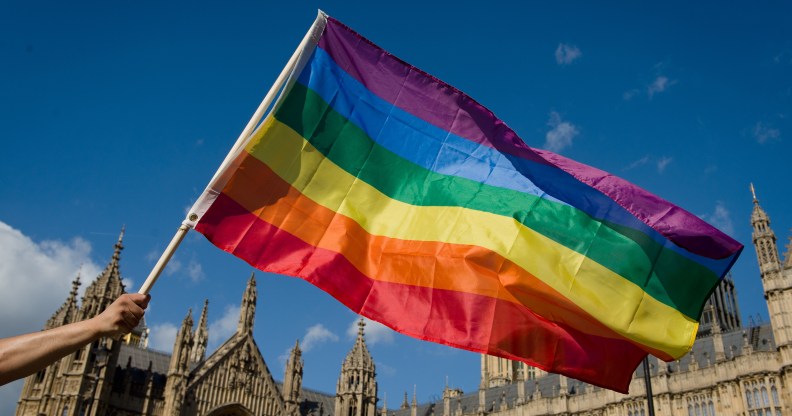Lib Dems claim Equality Bill contains “blatant prejudice” against trans people

A protester holds a rainbow flag outside the Houses of Parliament in central London on June 3, 2013, as protesters gather in support of same-sex marriage (LEON NEAL/AFP/Getty Images)
The Liberal Democrats have accused the government of “leaving the door open to discrimination” against trans people.
In a response to the consultation on the new Equality Bill, the government proposes that there should be protection against discrimination on the grounds of gender reassignment “in the exercise of public functions.”
That would cover activities such as setting national or local government policies, policing functions or allocating funds.
However, schools will be exempt.
“The welfare and care of school pupils is already extensively covered by education legislation, common law and the Human Rights Act,” the government said.
“For the very small number of cases of such a sensitive nature which may occur in schools, we believe that these provisions are sufficient.”
The response to the consultation tackles the issue of how to define a trans person.
The current definition of gender reassignment is: “a process which is undertaken under medical supervision for the purpose of reassigning a person’s sex by changing physiological or other characteristics of sex, and includes any part of such a process.”
The government consultation paper said: “Our intentions underpinning the reference to ‘medical supervision’ in the definition of gender reassignment are generally misunderstood.
“Our intention has never been to limit the protection of discrimination law to transsexual people who undergo ongoing medical supervision or gender reassignment surgery.
“Rather, the definition is intended to apply to people who make a commitment over a period of time to live permanently in their non-birth gender, with or without requiring surgical intervention.
“We have decided to amend the definition to make clear that the reference to gender reassignment being a process taken under medical supervision does not go so far as to require either ongoing medical supervision or gender reassignment surgery.
“This definition does not cover transvestites or others who choose temporarily to adopt the appearance of the opposite gender.
“Whilst we do not condone anyone being treated badly because of the way they present themselves, we do not consider it appropriate to provide a person who presents themselves temporarily in other than their birth gender with the same protection against discrimination that is available to a person with gender dysphoria.”
The Liberal Democrats said they will put forward amendments to the legislation to encompass those transgender people who would be excluded.
Liberal Democrat Youth and Equalities spokesperson, Lynne Featherstone said:
“This is supposed to be the discrimination bill to end all discrimination bills, and yet it will contain quite blatant prejudice.
“Only protecting people who are considering or have undergone gender reassignment surgery will leave huge swathes of the transgender population vulnerable to what, in effect, will be legalised discrimination.
“I will do my best to make sure the final legislation offers real protection for people who define their gender differently.”
The Equality Bill will be included in the Queen’s Speech in December.
It will not come before Parliament until February and given the detail in the legislation it may not become law until 2010.
Gay rights organisation Stonewall has welcomed the Equality Bill as it will also include a need for public bodies to promote gay equality.
Chief executive Ben Summerskill told PinkNews.co.uk:
“We have been pressing the government for two and half years to extend the duty to promote equality so that all public bodies are required to promote equal treatment among service users in the way they do already for race and gender.
“In terms of the impact it potentially has on millions of lesbian and gay people, it is very significant, because it does apply to every single service from policing to education to health.
“That is one of the reasons we have produced these three big pieces of research into those areas, so there is an evidence base to justify introducing this.”
Mr Summerskill explained that “actively promote” means that public bodies “have to think positively about how they serve all communities.
“At the moment it is a fantastic that there are laws in place protecting against discrimination but in some sense you only get the remedy against bad health care once someone something has gone wrong.
“What this will do is put hospitals in a position where they have to think positively about whether they are serving the lesbian population well, whether they are engaging them and whether people are feeling comfortable to be out with their doctor.”
Mr Summerskill also welcomed proposals in the legislation to extend women-only shortlists for Parliamentary candidates, calling them a “good idea,” but added:
“We would want some indication that some of the other features of the Equality Bill will apply to sexual orientation as much as they apply to anything else.
“We still have one openly lesbian parliamentarian out of 1,300 in the House of Commons and House of Lords. That is ridiculous.”

